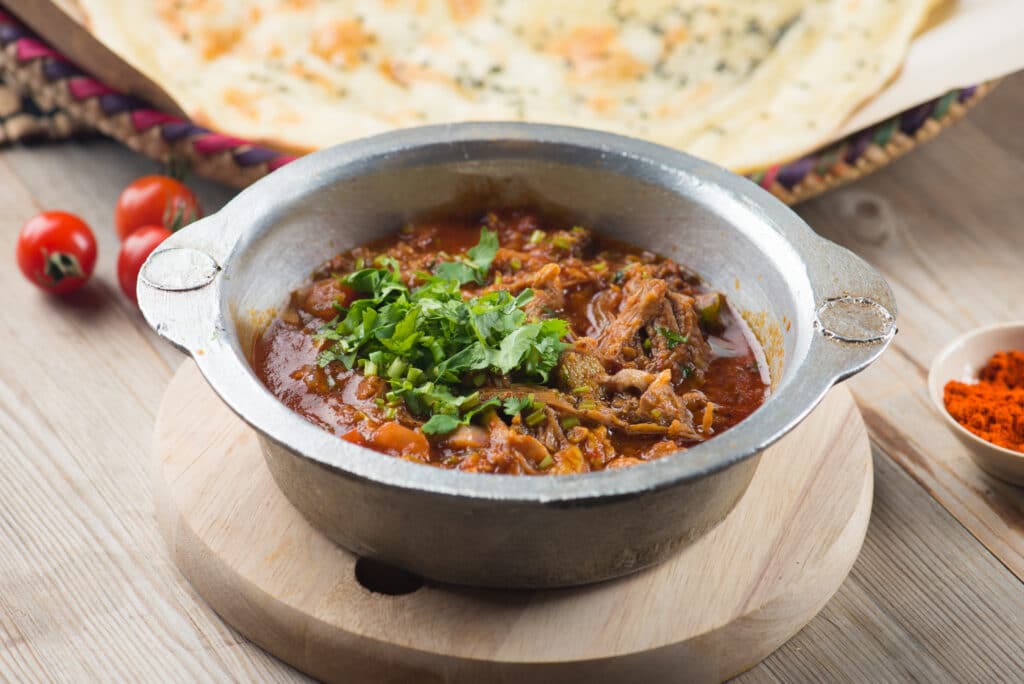
Nestled in the heart of the Middle East, Yemen boasts a rich culinary heritage. The national dish of Yemen, Saltah, is a testament to the country’s vibrant food culture, embodying a plethora of flavors and aromas.
Our dedicated team at Remitly created this guide as part of our series celebrating the traditional foods of our global customers.
Origins of Yemeni Saltah
Originating from the capital city, Sanaa, Saltah is a revered Yemeni dish that stands as a symbol of Yemeni food culture. This hearty meat stew combines a blend of spices, including cumin, coriander, and black pepper, offering a flavorful experience.
Culinary Composition
Saltah primarily comprises maraq (a spicy meat stew), rice, and a unique fenugreek paste known as hulba, highlighting the use of ground fenugreek.
This dish often incorporates a variety of vegetables such as okra and is served alongside Arabic flatbread or pita.
Cooking Process
Preparing Saltah involves sautéing cloves of garlic and chili pepper in vegetable oil over medium heat, followed by adding a blend of spices, including turmeric and ground coriander. The meat is cooked to tenderness in this aromatic mix, forming the basis of the maraq.
Fenugreek, a common condiment in Middle Eastern and Indian cuisine, is mixed with water to create a fenugreek paste, hulbah, that’s added to the stew. Cooking Saltah requires careful heat management, transitioning between medium and high heat to achieve the desired consistency.
Traditional Yemeni Saltah Recipe
Here’s how to make authentic Yemeni Saltah:
Ingredients:
- 500g meat (lamb or beef), cut into chunks
- 1 tablespoon vegetable oil
- 2 cloves garlic, minced
- 1 green chili pepper, chopped
- 1 teaspoon ground coriander
- 1 teaspoon ground cumin
- 1/2 teaspoon turmeric
- 1/2 teaspoon black pepper
- 1 cup chopped tomatoes
- 4 cups water
- 1 cup fenugreek paste (hulbah)
- Salt, to taste
- Flatbread or pita, for serving
- Fresh coriander and cilantro, for garnish
- Zhug and bisbas, as condiments
Instructions:
- Prepare the Maraq: In a large pot, heat the vegetable oil over medium heat. Add the minced garlic and chopped green chili, sautéing until aromatic. Add the meat chunks, ground coriander, ground cumin, turmeric, black pepper, and salt. Brown the meat on all sides.
- Add Tomatoes and Water: Once the meat is browned, add the chopped tomatoes and water to the pot. Bring the mixture to a boil, then reduce the heat and let it simmer until the meat is tender, about 1-2 hours.
- Prepare the Fenugreek Paste: While the stew is simmering, prepare the fenugreek paste (hulbah) according to package instructions or using a traditional recipe.
- Finalizing the Saltah: Once the meat is tender, add the fenugreek paste to the stew, stirring well to incorporate. Allow the Saltah to simmer for an additional 15 minutes, adjusting the seasoning if necessary.
- Serve: Serve the Saltah hot, garnished with fresh coriander and cilantro, accompanied by flatbread or pita, and with zhug and bisbas on the side as condiments.
Accompanying Elements
Saltah is traditionally enjoyed with a variety of accompaniments like zhug and bisbas, spicy condiments made from green chili, coriander, cilantro, and a mix of other spices. The dish is often compared to Turkish and other Middle Eastern cuisines, given the shared use of spices and herbs.
Exploring Yemeni Cuisine
Yemeni cuisine offers a diverse palate, reflective of its geographical location and historical connections to Arabic and Middle Eastern culinary traditions. Apart from Saltah, dishes like fahsa (a flavorful meat stew) and various flatbreads showcase the versatility of Yemeni cuisine.
Health Considerations
The use of spices like cumin, coriander, and turmeric in Saltah not only enhances the flavor but also brings potential health benefits. Fenugreek is known for its nutritional properties, while vegetables like okra add a dose of fiber to the dish.
Conclusion
Saltah, the national dish of Yemen, invites everyone to explore the rich culinary heritage of Yemen. With its unique combination of spices, vegetables, and condiments, this Yemeni dish encapsulates the warmth and traditions of Sanaa and the broader Middle East.
Remitly is proud to celebrate the diverse and vibrant food cultures of our global customers, and we invite you to discover more about Yemeni and regional Gulf cuisine.